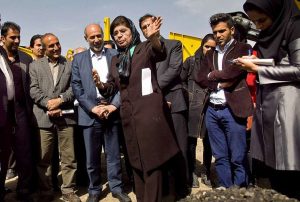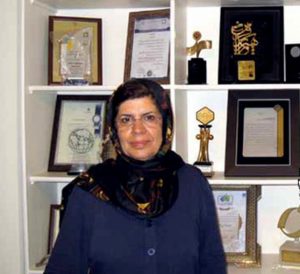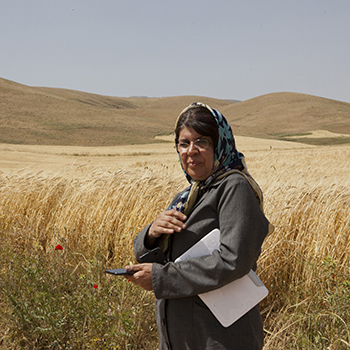From very early childhood, Hayedeh Shirzadi showed her determination to better her own life and the lives of others. When she was about to turn 60, she successfully launched an environmental initiative that made waste dumps mostly a thing of the past — the project had an impact on 70 cities and 200 villages in Iran.
Shirzadi, born in 1958, was the eighth child of a farmer family in Gilan-e Gharb in the western Iranian province of Kermanshah. She was so interested in reading and so precocious that in 1962, the family ensured she was given a new ID card so that she could get into school when she was just four years old, though this decision came with potential problems of its own. “It was customary to add to the age of girls on their birth certificates so they could reach the legal age for marriage earlier,” said Shirzadi. “When I finished the sixth grade of the primary school I was still a child.”
Her father was a literate man but there was no middle school for girls in their town, so she was unable to continue her education and had to rely on her father’s books and newspapers to learn more about the world. According to her, there was not a single paved road in her city and unlike her brothers and male cousins, she could not travel to the nearby town of Qasr-e Shirin to continue her studies.
But it was not in her character to give up her quest for an education. In September 1968, the national newspaper Ettela’at published a story about a young girl who had blocked the way of the provincial governor and had demanded that he build a middle school for girls in her town. This girl was Hayedeh Shirzadi. She pursued her demand for three years until they started building the school. In the meantime, she studied at home and passed the exams. But when the school opened its doors she was already ready for high school, and the town did not have a high school.

Shirzadi decided to continue studying at home, but high school courses were not easy to master without a teacher, so she chose homemaking as her field of studies. She was not prepared for taking university entrance exams so she chose the only course open to her and joined the Literacy Corps, which was created by the shah as part of his 1963 White Revolution as an alternate form of compulsory military service. Under the scheme, high school graduates taught in underprivileged areas of the country. Girls were exempt from military service but they could join the corps voluntarily. (Literacy Corps and similar services were terminated after the 1979 Islamic Revolution.)
“The positions were decided by lottery,” said Shirzadi. “I became the first member of the Literacy Corps in that area when I was 16. The cultural restrictions were so strict that they would not send girls to villages, but I demanded it and they sent me.”
Appealing to Civic Pride
Hayedeh Shirzadi had experienced what it meant to be deprived of education and set out to help girls in her area. She was not yet 18 when she persuaded the local population to contribute funds for education. With that money she broke the ground for schools in two villages. When the schools opened, not only did girls get their chance for an education, but even boys of those two villages and villages around them returned from nearby cities to be schooled in their own communities.
But Shirzadi did not want to stop there. She wanted a university education. She was still serving with the Literacy Corps when she convinced her family to let her take university entrance exams. However, only a vocational school at the University of Kermanshah accepted her for a university course.

In 1978 Shirzadi returned to Gilan-e Gharb with an associate degree and became a teacher at one of the schools that she herself had helped establish. The job lasted only for a year because the school officials were not happy with her forceful character. She decided to emigrate and experience life in another country.
“At first I wanted to go to India because it was cheap to study there,” she said. “I had no relatives in Europe to invite or support me. After I received the letter of admission, I was going to get the visa for India, when by chance I found myself outside the German Embassy.” She saw a notice on the wall that said the embassy would issue tourist visas to applicants with enough hard currency. “I returned to Kermanshah and used my savings to buy a little currency. Then I went back to Tehran and to the German Embassy and got an appointment for a visa interview. In 1985 I got my tourist visa. I said to myself the first person who had traveled abroad must have been all alone without knowing anybody. I could imagine myself as being that first person and I would do my best. I consulted with my sisters and my second brother — who unfortunately died a year after I left. My brother said that he had trust in me and would support me.”
Alone in a Strange Land
Hayedeh Shirzadi left Iran for Germany with only a few hundred dollars. Once there she found out that her associate degree was not worth much, but this did not stop her. “After evaluating my papers they decided that I was at a level equivalent to the 11th grade,” she said. “After a six-month course in the German language I attended a German high school…At the beginning there were 36 of us, but because the courses were difficult, some left the school, and of those who remained, only 25 percent passed the exam. I was the only foreigner at school who passed with very good grades.”
After getting her high school diploma — again — she enrolled at the University of Kassel to study agriculture. She lived a hard life and worked at a restaurant to pay for herself. Every day she had to travel 70 kilometers between two German states because she was allowed to reside and work in one state, while her school was in the next state where she was not allowed to work.
Her family members were farmers and she was quite aware that Iranian agriculture was not modern and needed an infusion of modern science, techniques and technology. After starting at the university, she learned that there was also a field called Environmental Protection and that the University of Kessel was a pioneer in the field. After completing her studies in agriculture she continued her studies in environmental sciences and bio-compost.
She married a German citizen, but after her graduation in 1992, she returned to Iran to offer her bio-compost project to municipalities on her own. She pressed Kermanshah’s municipality to adopt her plan for bio-compost to turn waste into fertilizer but was rebuffed. It was the reconstruction years following the Iran-Iraq war and officials did not have a lot of patience with ideas that went beyond urgent and immediate necessities. “When I failed to convince the officials, I said to myself that I was not knowledgeable enough to reach my goal,” she remembered. “So I returned to Germany to study about environment and waste management at a higher level. This time I was more determined than ever. I talked to my husband and registered.”
A Cheaper Way to Save the Environment
“One day my husband came to our class as a guest and loved the subject,” she said. “He said he wanted to take the courses as well. At that time he had been an agricultural consultant for eight years and managed a clean energy park…We studied together and worked together on our dissertations. During my studies I came to the conclusion that European countries’ methods for bio-compost were too expensive for countries like Iran.”
Finding a cheaper way for bio-compost occupied Shirzadi for a long time and she did her Ph.D. dissertation on the topic. After she completed her dissertation, she returned to Iran. This time her husband accompanied her. For six months they carried out research in Kermanshah, but her proposals were rejected again and they returned to Germany.
“It was 1999 when I heard that [Kermanshah] had a new mayor,” she said. “I immediately packed my bags and left for Iran. I remember it was a Thursday and I immediately contacted the mayor’s office and asked for an appointment. A few minutes later they informed me that the mayor would see me and had said that I had to be there by sunset. I went and he accepted my project and said it would be implemented. He also gave me the idea of opening a recycling company.” She and her husband eventually founded the Recycling and Organic Fertilizer Production Company of Kermanshah, which now employees 70 people. They also work as consultants, and have created 700 jobs in the area. In the years since, she has been honored many times as a job creator and a protector of the environment.
Hayedeh Shirzadi has come a long and difficult way to protect the environment in Iran and her homeland. But she is still going strong and has no intention of retiring any time soon.



